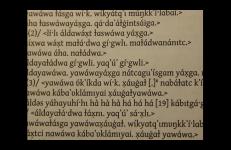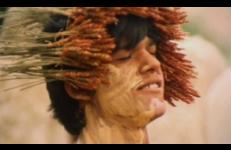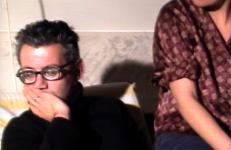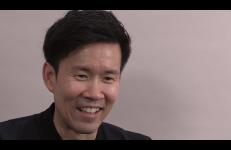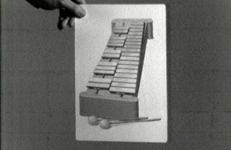An Unangam Tunuu elder describes cliffs and summits, drifting birds, and deserted shores. A group of students and teachers play and invent games revitalizing their language. A visitor wanders in a quixotic chronicling of earthly and supernal terrain. These visions offer glimpses of an island in the center of the Bering Sea.
Language
A playful and dark conversational study—wrapping prose poetry into the recognizable conversational form and allowing both connections and missed meanings. First the ladies visit, the image—a roving camera lovingly viewing a still image—calls up both the progress and stagnancy of their talk, then they go to watch a play—on a television, in a snow garden. In many ways the play references the cadence of the ladies' conversation—the tedious animosity and lack of attentive or appropriate response.
A personal interpretation of the poetry and letters of T.S. Eliot that explores the ambiguities of language and space in a scenario built around an anagram. "A brilliant, absurd staging of Eliot’s The Waste Land in the local pub by the master of irony himself, John Smith. Smith’s use of the subjective camera tradition of independent film takes the viewer on a shaky journey from bar to bog and back again."
—UK/Canadian Video Exchange (touring program, 2000)
Wawa peeks at the anxieties and difficulties of communication through the interactions between speakers of an endangered Indigenous language, each from differing cultural backgrounds and generations. By transforming the chronology of the language, it weaves the past and present into a single entity and confronts various modes of conversation, translation, identity, and history.
The result of a three-year project with inmates from a high security prison in Romania, Wings for Dogs is an essay about language and its capacity to simultaneously communicate and hide issues connected to guilt and responsibility.
There are times when concurrent multiple realities of place demand at least a simple attempt to determine who in fact has and where is this place in the sun. Hearts and Helicopters occurs at that moment in the lives of four people.
This title is also available on Lawrence Weiner: Hearts and Helicopters - A Trilogy.
Ming Wong creates videos that explore performance and issues of race and gender. Born in Singapore of Chinese heritage, and now based in Berlin, his work examines cross-cultural experiences by appropriating scenes of iconic world cinema. Wong casts himself anachronistically as the star, critically exposing the otherness of the relationship of media and world history.
Presenting a series of flashcards to the camera, Baldessari continues his exploration of visual semantics, defining the intersection of language and image. In this instance, each flashcard bears a picture that represents a letter of the alphabet. Like Teaching a Plant the Alphabet, a secondary theme of Xylophone is a critique of learning as memorization, with the length of the tape producing—not surprisingly—an effect of boredom rather than insight.
This title was in the original Castelli-Sonnabend video art collection.







